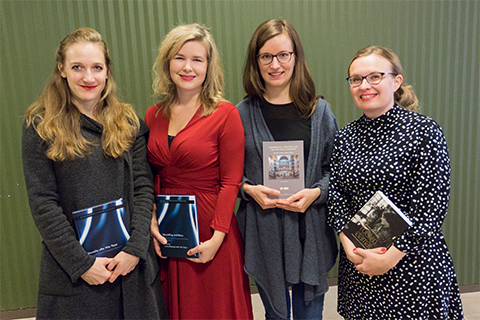New Publication Explores the Ethics of Storytelling in Different Art Forms
Stories have power, in both good and bad. According to Professor of Comparative Literature Hanna Meretoja from the University of Turku, some cultural practices of storytelling are connected to repressive mechanisms of power, while other practices are empowering. Professor Meretoja and Professor of French and Comparative Literature Colin Davis from Royal Holloway (University of London, England) have edited the publication Storytelling and Ethics which examines the ethical potential and risks of different storytelling practices, with focus on storytelling in relation to traumatic experiences.

SELMA: Centre for the Study of Storytelling, Experientiality and Memory aims at crossing the borders between research and artistic creativity by creating dialogue, promoting social engagement and fostering international collaboration between scholars, artists and other people outside academia. This autumn, researchers at SELMA have published four publications examining the relations between experience, storytelling and memory. From the left, Postdoctoral Researcher of Comparative Literature (TIAS) Nena Moĉnik, Director of SELMA, Professor Hanna Meretoja, Researcher of Comparative Literature Kaisa Kaakinen, and University Lecturer of Cultural History Maarit Leskelä-Kärki.
The collection Storytelling and Ethics: Literature, Visual Arts and the Power of Narrative (Routledge 2017) edited by Hanna Meretoja and Colin Davis, is the main product of the research project The Experience of History and the Ethics of Storytelling in Contemporary Arts funded by the Emil Aaltonen Foundation which supports Finnish academic research. Authors of the multidisciplinary collection include the project’s researchers and partners. The partners are internationally leading researchers of narrative and cultural memory, from the fields of literary research, visual arts and trauma studies.
– The publication examines the ethical potential and risks of different storytelling practices. The focus is especially on the possibilities of different narrative strategies in dealing with traumatic historical events that are difficult to discuss. The publication emphasises the strong connection between remembering and imagining, and suggests that arts can develop our narrative, historical and ethical imagination, says Meretoja.
The articles of the multidisciplinary collection explore, for example, the possibilities and limitations of storytelling, the temporality of storytelling, and narrative engagements with violence and trauma in contemporary arts. At the end of the book, war photographer and journalist Louie Palu reflects on the ethical questions related to his work.
– The book suggests that stories have power in both good and bad. Some cultural practices of storytelling are connected to repressive mechanisms of power, while others are empowering. Instead of idealising or opposing storytelling practices as such, the book provides analytical tools for discerning the complex ethics of storytelling. It examines the possibilities and risks of narratives in building identities and communities, and in studying the relationship between the human and the non-human, says Meretoja.
The international and interdisciplinary SELMA: Centre for the Study of Storytelling, Experientiality and Memory at the University of Turku promotes interdisciplinary research and organises seminars, symposia and other events on both theoretical and topical social issues. This autumn, researchers at SELMA have published four publications with focus on the interrelations between experience, storytelling and memory.
Maarit Leskelä-Kärki: Toisten elämät. Kirjoituksia elämäkerroista. Avain 2017.
Text and photo: Maria Vasenkari
Translation: Jenni Maja